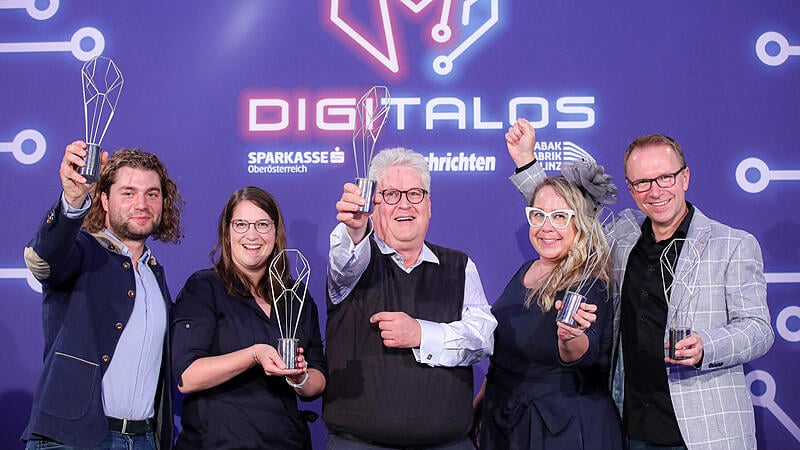Image: Volker Weihbold

Image: Volker Weihbold
“I explained what ChatGPT can do two years ago at university”, says Sepp Hochreiter. He talks to OÖN about the importance of digitalos, language models and the struggle with cell phones.
OÖN: How important is the Digitalos for you as a price collector?
Sepp Hochreiter: I like the Digitalos because they appreciate what is local: my work in Linz, the JKU and how I try to help the companies. Of course, it is particularly pleasing that people can see that you are being honored.
In your job, is it difficult to make your work visible to the general public?
Yes, absolutely. Artificial intelligence also often has negative connotations. Some are afraid of it, some are worried about losing their job, and some may also see opportunities. But nobody really knows what this thing is. Is what Sepp is doing good, or should I be afraid? AI is difficult because nobody understands it.
Do you understand it yourself?
Yes, I’ve been in there for 30 years. With some systems, no one would have thought before that they would one day be able to do this or that. But with a lot of things that are amazing to most now, I would have thought that would happen, like ChatGPT. But there are always surprises for me too, how much you can already achieve.
Are you afraid of losing your job due to AI?
Not yet. I have two areas: research and teaching. And if there are standard teaching methods, I can imagine that at some point an AI will be able to teach the basics better. In research it will take longer, I think.
There is a lot of discussion about ChatGPT. What do you think?
I explained what ChatGPT can do in my lectures two years earlier. And the Transformer Language Model is a successor to LSTM (Long Short-Term Memory). ChatGPT itself didn’t surprise me that much. I was surprised that the public was so flabbergasted.

Image: Volker Weihbold
You have developed a similar model yourself.
I have something better than ChatGPT with XLSTM, the successor to LSTM. And it was developed in Linz. That’s why I see it with mixed feelings. We don’t have the computing power for large data sets, but we are better than ChatGPT for small data sets. I could always go to Meta or Google, they’d take it right away.
But you are in Linz. What would you need to scale the program? People? Money?
Mostly computers, but also the people. Even if I had 50 or 100 million euros, people are not in the market. They’re in the bigger companies right now.
How would you describe your research base in Linz?
A lot has stabilized, more and more people are coming out of the AI studies. And there are more and more interested companies from Upper Austria and southern Germany. We also have projects that go in the direction of security of language models and climate protection.
The pegs for the new digital university in Linz have now been driven in. Your opinion?
I wasn’t involved and don’t know where it’s going. I haven’t even spoken to the new principal yet. I’ll wait.
Digitization has arrived, at the latest with Corona. Do you think the trend will continue, or is it going in the opposite direction?
There are always opposite directions when you spend too much time on your computer or mobile phone. But I think the trend is continuing. Digitization makes many things easier and more convenient.
How are you doing with that?
Sometimes I struggle with my cell phone because I can’t open the bank account or I make a typo. But for me it’s good professionally because you can work together efficiently even if you’re not in the same place. Nevertheless, there is no substitute for personal contact.
To person
Sepp Hochreiter (56) has done groundbreaking work in the field of artificial intelligence and machine learning. Its “Long Short-Term Memory” technology is the basis for speech recognition in mobile phones and navigation systems. In 2006, Hochreiter came to Linz and took over the Institute for Bioinformatics at the JKU, which is now run as the “Institute for Machine Learning”. Born in Bavaria, he is married and has three children.
- Digitalos Prize: Apply here
more from Digitalos




